“That first night we attended Sweet Charity, which was the first time I ever saw Gwen Verdon live, and the first time I understood what ‘triple threat’ meant. She could sing, God knows she could dance, but she was also an incandescent actress, and I found myself in tears during ‘If They Could See Me Now!’ experiencing the melting of all resistance that occurs in the presence of a star.”
Jack O’Brien, Jack Be Nimble: The Accidental Education of an Unintentional Director
Archives for July 2013
HOW LONG-RUNNING PLAYS MAKE IT ON BROADWAY
“Today it’s inordinately hard for a straight play, no matter how good it is, to run on Broadway for more than a few months, since the first ingredient in the modern recipe for theatrical success is the presence in the cast of a movie or television star. As soon as the star in question returns to Hollywood to resume his or her screen career, the show closes. Things really were different in the old days…”
TT: Solo flight (III)
I flew back to New York on Thursday, just in time to be smacked in the face by the tail end of the protracted heat wave that overwhelmed the city around the time that I headed west to San Francisco. Mrs. T had wisely retreated to rural Connecticut in an attempt to stay cool, and when I unlocked the door of our apartment and poked my head into the living room, it felt as though I were inspecting the interior of a pizza oven.
I had to run the air conditioner for a full hour before my bedroom-office become more or less livable. Still, I was home again, sleeping in my own bed and surrounded by the works of art that Mrs. T and I had painstakingly hung two weeks earlier, and that was consolation enough.
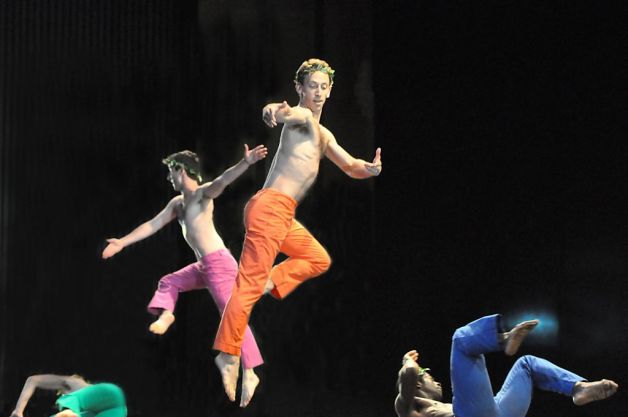 On Friday I laid low, applying a few last editorial touches to the libretto of The King’s Man, my latest operatic collaboration with Paul Moravec, then shipping the results off to him in Rome via e-mail. I emerged at dusk to meet Ethan Iverson for dinner at a restaurant around the corner from the Village Vanguard, where the Bad Plus was playing.
On Friday I laid low, applying a few last editorial touches to the libretto of The King’s Man, my latest operatic collaboration with Paul Moravec, then shipping the results off to him in Rome via e-mail. I emerged at dusk to meet Ethan Iverson for dinner at a restaurant around the corner from the Village Vanguard, where the Bad Plus was playing.
Ethan and I met in 1999 when I was writing a piece about the Mark Morris Dance Group for the New York Times. (It’s in the Teachout Reader.) In those days he was still Mark’s music director and rehearsal pianist, but a year later he, Reid Anderson, and David King started the Bad Plus, a trio that plays what its members call “avant-garde populism (progressive, musically sophisticated ideas without the highbrow trappings).” Today they perform all over the world, most recently at California’s Ojai Festival, where the group collaborated with Mark on “Spring, Spring, Spring,” a new dance set to the Bad Plus’ trio version of The Rite of Spring.
Because Ethan and I spend so much time on the road, we rarely get to see one another. It was a rare pleasure to spend an hour chatting with him about our common interests, which include the novels of Anthony Powell (he was sitting at the bar reading The Kindly Ones when I showed up at the restaurant) and Donald Westlake (about which Ethan has written astutely and at length on his blog, “Do the Math”). I presented him with a set of bound galleys of Duke: A Life of Duke Ellington, after which we proceeded to the Vanguard, he to play piano and I to listen.
 I’ve been a fan of the Bad Plus ever since they first got together. In 2003 I reviewed their first major-label album for the Washington Post, and waxed enthusiastic about it:
I’ve been a fan of the Bad Plus ever since they first got together. In 2003 I reviewed their first major-label album for the Washington Post, and waxed enthusiastic about it:
The Bad Plus is a piano trio, one of jazz’s most familiar lineups–only Ethan Iverson, Reid Anderson and David King don’t sound anything like Ahmad Jamal or Oscar Peterson. Instead of the usual show tunes and jazz standards, they play “Smells Like Teen Spirit,” “Heart of Glass,” and weirdly tilted original compositions with titles like “Silence Is the Question” and “Keep the Bugs Off Your Glass and the Bears Off Your Ass.” Their producer is Tchad Blake, whose credits include albums by Elvis Costello, Suzanne Vega and Pearl Jam. And These Are the Vistas (Columbia), their major-label debut, isn’t just a breath of fresh air–it’s a tornado….
The Bad Plus doesn’t do cutesy watered-down covers of hit singles. Instead, they deconstruct the songs of Blondie, Nirvana and Aphex Twin with the same rigorous conceptual clarity that goes into their own originals, and their group sound–blunt, clear-cut, full of splintery dissonances and jolting musical jokes–blends jazz, rock and classical music so indissolubly as to make the differences between the three musics seem trivial.
Not at all surprisingly, traditional jazz buffs found it all but impossible to grasp what the group was trying to do, and they got a stack of uncomprehending reviews. Before long, though, the rest of the world caught up with the Bad Plus, and now they’re hugely and deservedly popular. (Their Vanguard gig was sold out.) It pleases me greatly to have known them when.
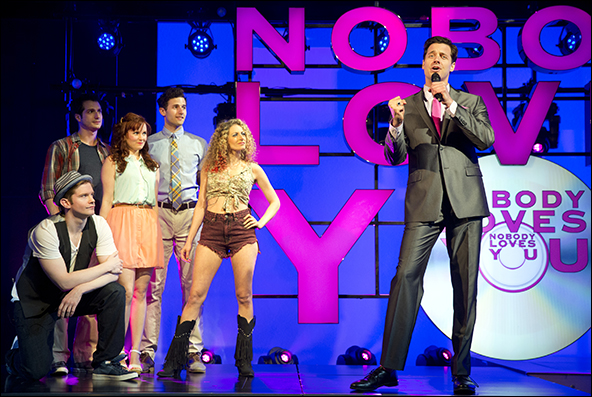
On Saturday I took in the off-Broadway transfer of Nobody Loves You, the new musical about reality TV and its discontents whose San Diego premiere I reviewed with hats-off enthusiasm last May. I met Mrs. T in Connecticut the following afternoon for the press opening of the Westport Country Playhouse’s revival of Joe Orton’s Loot. We went straight from the theater to our place in Connecticut, where we’ll be spending the next four days in comparative tranquility. Come Friday we hit the road again. Our twin destinations are the Hudson Valley Shakespeare Festival and Ontario’s Shaw Festival, where we’ll see five plays by Shakespeare, Shaw, Somerset Maugham, and Brian Friel.
For now, though, my travels are temporarily over, and though I love the flâneur‘s life, I won’t deny for a moment that I’m more than glad to be back home again with Mrs. T, where I belong.
(Last of three parts)
* * *
A music video of “Physical Cities,” performed by the Bad Plus last week at the Village Vanguard:
TT: Just because
Bob Fosse and Gwen Verdon demonstrate the creation of the “Whatever Lola Wants” scene from Damn Yankees! in a 1962 TV film interview:
(This is the latest in a series of arts-related videos that appear in this space each Monday and Wednesday.)
TT: Almanac
“The thing about all early success is what a natural amphetamine it proves to be, how it feeds on itsef, how easily the dish runs away with the spoon. And the other universal truth is the utter lack of fear one has whenever staring at that metaphorical high dive for the very first time. ‘I loved your early stuff’ is a cliché funny as well as heartbreaking, because the early work is so often effortlessly spontaneous. One doesn’t perceive the abyss ahead, the incipient danger. We love discovering people and happily proclaiming their success; we just don’t like them to make a habit of it.”
Jack O’Brien, Jack Be Nimble: The Accidental Education of an Unintentional Director
TT: Why can’t My Fair Lady be more like Galileo?
In today’s Wall Street Journal drama column I review two unconventional West Coast festival productions of a pair of well-loved classics, the Oregon Shakespeare Festival’s My Fair Lady and California Shakespeare Theater’s Romeo and Juliet. Here’s an excerpt.
* * *
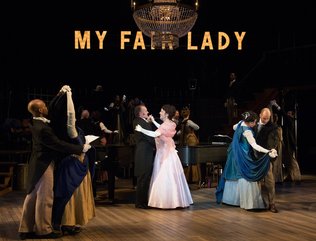 Small-scale revivals of big Broadway musicals are hot nowadays. Not only are they cheaper to produce, but they allow smart directors to use their creativity to the fullest. Some of their ideas make better conceptual sense than others, however, and I had a twinge of doubt when I heard that the Oregon Shakespeare Festival had invited Amanda Dehnert to mount a miniature “My Fair Lady.” Of all the great musicals of the postwar era, “My Fair Lady” is the one that most closely resembles an old-fashioned operetta, and the spare-no-expense décor of both the 1956 Broadway production and the 1964 screen version have come to be seen as integral to its total effect. All the more reason, then, to cheer Ms. Dehnert, who has successfully wrought a radical transformation on the familiar parable of Henry Higgins (Jonathan Haugen), the haughty professor of phonetics, and Eliza Doolittle (Rachael Warren), the blunt-tongued Cockney flower girl whom he turns into a lady. She’s staged the whole thing in the style of Bertolt Brecht–and it works.
Small-scale revivals of big Broadway musicals are hot nowadays. Not only are they cheaper to produce, but they allow smart directors to use their creativity to the fullest. Some of their ideas make better conceptual sense than others, however, and I had a twinge of doubt when I heard that the Oregon Shakespeare Festival had invited Amanda Dehnert to mount a miniature “My Fair Lady.” Of all the great musicals of the postwar era, “My Fair Lady” is the one that most closely resembles an old-fashioned operetta, and the spare-no-expense décor of both the 1956 Broadway production and the 1964 screen version have come to be seen as integral to its total effect. All the more reason, then, to cheer Ms. Dehnert, who has successfully wrought a radical transformation on the familiar parable of Henry Higgins (Jonathan Haugen), the haughty professor of phonetics, and Eliza Doolittle (Rachael Warren), the blunt-tongued Cockney flower girl whom he turns into a lady. She’s staged the whole thing in the style of Bertolt Brecht–and it works.
In this visually austere production, which Ms. Dehnert created in 2000 for the Trinity Repertory Company in Providence, R.I., and has since remounted in Cleveland and Louisville, the first thing you see when you enter the theater is a pair of grand pianos at center stage. Behind them are two tiers of bleacher-style seats, with staircases on either side. The result is a compact playing area that looks rather like an Edwardian rehearsal hall, an impression strengthened when the action gets underway and the actors start changing costumes in front of the audience. But Ms. Dehnert’s production is neither a mock rehearsal nor a semi-staged concert version: It’s a presentation of “My Fair Lady,” one in which the actors seem almost to be telling the story to you rather than performing it in a 600-seat theater, eschewing elaborate props and set pieces and relying on the show itself to make its own meaning plain. The effect is not didactic but warm and intimate…
Ms. Dehnert, a one-time musician who has doubled as her own music director in addition to staging the show, makes sure that the songs are given their full expressive value (so much so that Mr. Haugen sings his numbers instead of speaking the lyrics à la Rex Harrison, a pleasing touch). As for Matt Goodrich and Ron Ochs, they play Trude Rittman’s two-piano arrangement of Loewe’s score with such blazing brio that you won’t regret the absence of a pit orchestra….
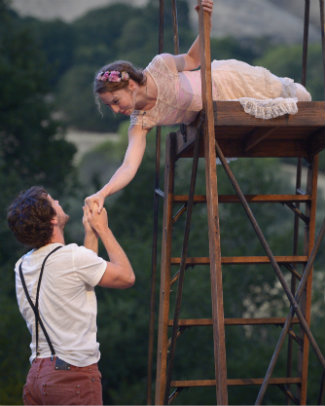 In addition to staging “My Fair Lady” in Oregon, Amanda Dehnert was supposed to do a “Romeo and Juliet” for California Shakespeare Theater, which puts on four shows each summer in its San Francisco-area hilltop amphitheater. Illness forced her to withdraw, but Shana Cooper, Ms. Dehnert’s replacement, turns out to much more than a mere substitute. She, too, has opted for lively simplicity, giving us a clean-lined, fast-paced modern-dress “R & J” in which all of the roles are played on an open stage by a seven-person cast and Shakespeare’s star-crossed lovers (Rebekah Brockman and Dan Clegg) look as though they graduated from high school last week. The tone is boisterous–Ms. Brockman’s Juliet is zany, giggly and plainly eager to get her beau into bed–and Paul James Prendergast’s techno-pop music heightens the right-this-minute atmosphere….
In addition to staging “My Fair Lady” in Oregon, Amanda Dehnert was supposed to do a “Romeo and Juliet” for California Shakespeare Theater, which puts on four shows each summer in its San Francisco-area hilltop amphitheater. Illness forced her to withdraw, but Shana Cooper, Ms. Dehnert’s replacement, turns out to much more than a mere substitute. She, too, has opted for lively simplicity, giving us a clean-lined, fast-paced modern-dress “R & J” in which all of the roles are played on an open stage by a seven-person cast and Shakespeare’s star-crossed lovers (Rebekah Brockman and Dan Clegg) look as though they graduated from high school last week. The tone is boisterous–Ms. Brockman’s Juliet is zany, giggly and plainly eager to get her beau into bed–and Paul James Prendergast’s techno-pop music heightens the right-this-minute atmosphere….
* * *
Read the whole thing here.
Amanda Dehnert talks about her staging of My Fair Lady:
TT: Grandma’s Broadway
In today’s Wall Street Journal drama column I take a close look at a little-known list from yesterday, and see what it tells us about American theater today. Here’s an excerpt.
* * *
Two aging theater buffs strike up a conversation. Says Old-Timer No. 1: “Broadway isn’t what it used to be.” To which Old-Timer No. 2 replies, “No, and it never was.”
Who’s right? Both of them.
It’s true that Broadway has become a money-making machine chiefly devoted to the production and marketing of tourist-friendly commodity musicals. And it wasn’t always that way. Of the top 10 shows that made Entertainment Weekly’s recently published list of the best plays of the 20th century, five were premiered on Broadway between 1938 and 1962. But anyone naïve enough to believe in the existence of a golden age when Times Square was a playground for highbrows should look at a list of Broadway’s 10 longest-running straight plays….
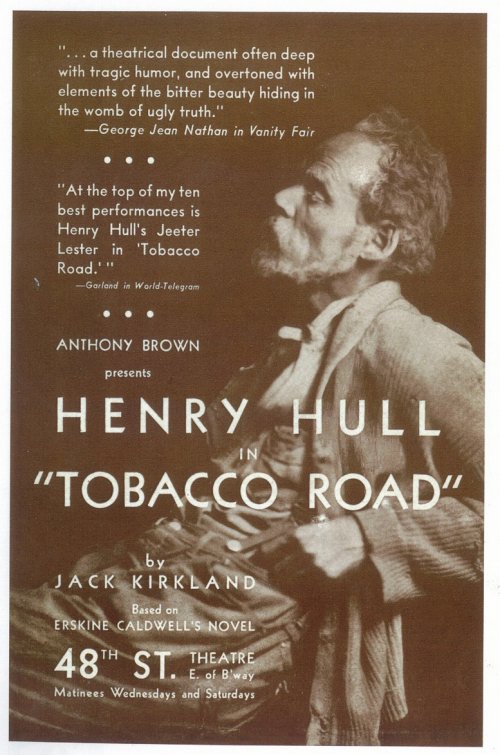 What do these plays have in common? To begin with, the “newest” of them opened 35 years ago. Three others date from the ’60s and ’70s. The rest are antiques. Today it’s inordinately hard for a straight play, no matter how good it is, to run on Broadway for more than a few months, since the first ingredient in the modern recipe for theatrical success is the presence in the cast of a movie or TV star. As soon as the star in question returns to Hollywood to resume his or her screen career, the show closes….
What do these plays have in common? To begin with, the “newest” of them opened 35 years ago. Three others date from the ’60s and ’70s. The rest are antiques. Today it’s inordinately hard for a straight play, no matter how good it is, to run on Broadway for more than a few months, since the first ingredient in the modern recipe for theatrical success is the presence in the cast of a movie or TV star. As soon as the star in question returns to Hollywood to resume his or her screen career, the show closes….
On the other hand, all but two of the plays on the top-10 list are light comedies of one kind or another. “Abie’s Irish Rose,” “Barefoot in the Park,” “Born Yesterday,” “Mary, Mary” and “The Voice of the Turtle” are romcoms, “Gemini,” “Harvey” and “Life With Father” domestic farces. The only exceptions are “Deathtrap,” a gimmicky whodunit by the author of “Rosemary’s Baby,” and “Tobacco Road,” the stage version of Erskine Caldwell’s once-shocking 1932 novel about the sex lives of Georgia sharecroppers. Otherwise, it appears that our great-grandparents were as partial to laughter as we are, if not more so.
Even more interesting is that most of these once-popular plays are largely forgotten today….
* * *
Read the whole thing here.
TT: Almanac
“Democracy, in fact, is always inventing class distinctions, despite its theoretical abhorrence of them.”
H.L. Mencken, Notes on Democracy
